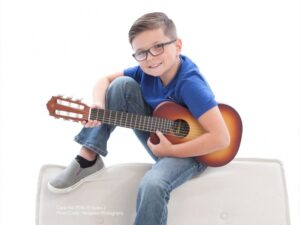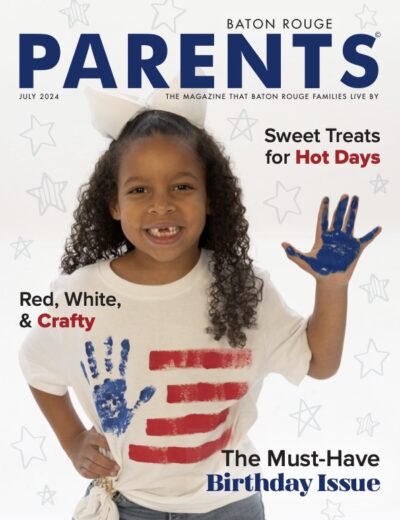
For the Love of the Arts
When Jenny Ballard was 11 years old, her parents took her to see a play. It was Shakespeare’s As You Like It–an experience that she’s never forgotten. “I remember the way it transformed the way I thought about the world,” she says. “From the lights going down to the set pieces changing–I felt like I could do anything, full of hope, like there was magic in the world.”
Today, Ballard, 41, lives that passion in her role as Managing Artistic Director of Theatre Baton Rouge. Since 1947, the theater has produced and staged over 400 performances, from musicals and comedies to the classics. “I wanted to be involved in that for the rest of my life,” she says. “I wanted to create worlds like that so others could have that feeling.” In today’s environment of judgement and bullying, other worlds may prove increasingly important for today’s kids.
Theatre specifically, says Ballard, teaches tangible life skills, from confidence, empathy, and teamwork to decision-making and public speaking. “You learn the ability to walk in another person’s shoes, and learn about cultures and lifestyles that you might not otherwise be exposed to,” she says. “I think that’s more important than ever.”
For Baton Rouge’s youngest, there are many ways to get involved, namely through the Young Actors Program. Young actors perform a free production for children; they also take the performance to area schools.
Hope Carline’s children have been involved in the Young Actors Program for over two years. With a background in musical theatre and dance herself, Carline now makes costumes and supports her 13-year-old daughter, Sammie’s, theatre interests. Carline’s son, Zachary, 15, who has always loved to sing and dance, also participates. “They have both made lasting relationships,” she says. “And they always feel safe and welcome to be whoever they want to be when they walk through those doors.”
The theatre offers year-round classes and camps for ages five and up. Classes center on the basics of performance–acting, voice instruction, and improvisation. October brings open auditions for A Christmas Carol, and the theatre ends its season with Roald Dahl’s Matilda. “This show is a great example of the power of imagination,” says Ballard. “Exposing your kids to theatre grows that imagination in them, so they can tap into the world inside their heads.”
But even more than the creative opportunities, Ballard says, theater can be life-changing. “All of these kids say that the theater is the first place where they feel they can be themselves and were accepted,” she says. “That’s more important than ever.”
Learning to share the spotlight
Growing up next door to a dance studio, Molly Buchmann says ballet was a natural choice. But a visit to hear the Baton Rouge Symphony Orchestra was what sealed her interest in the arts. “I was so taken by the live orchestra–that’s what really opened my eyes into wanting to know more,” she says.
Today, Buchmann is the artistic director of Baton Rouge Ballet Theatre. Retired from the LSU department of theater, she has choreographed over 50 musicals for professional and community theaters, and works hard to offer other young people the experiences she had.
Whether in youth ballet, summer intensives, or the annual Nutcracker production, there are many ways kids can get involved.
For children looking to dip their toes in, Buchmann suggests The Nutcracker: A Tale from the Bayou, a vibrant show that puts a Louisiana cultural spin on the popular holiday juggernaut. Children as young as eight can audition for roles as lambs, cherubs, and mice, for a performance that brings in 8,000 people per season. This year’s auditions will be held on Sunday, September 29 at The Dancer’s Workshop.
“What they learn is invaluable,” Buchmann says. “Other than becoming physically fit at a very athletic level, [ballet] teaches time management and responsibility–being a part of a team and understanding when you should have center stage, and when you shouldn’t.”
With a 40-piece live orchestra, visual arts, choreography, acting, vibrant sets–The Nutcracker is a wonderful window into the arts. “It’s a great first chance for kids to say, ‘Wow. This is beautiful and the arts can be fun’,” Buchmann says.
The power of make-believe
Louisiana has long been known for its influence on opera in the U.S., with nearby New Orleans boasting America’s first staged opera over 200 years ago. “Opera is meant to be for the people,” says Opéra Louisiane General Director Leanne Clement. “It was created as a way to take advantage of the power of the human voice–we all have it in common.”
Clement grew up in rural Virginia, with little access to the arts. One day, an opera program visited her middle school. “There were four singers on stage and they would take off their hats and become a different character, singing an aria from that opera,” she says. “I remember that so vividly–before that, I didn’t have exposure to opera.”
Today, she pays it forward, overseeing similar outreach programs with Opéra Louisiane. One of the best ways to try the opera, says Clement, is through the Young People’s Opera Program, which this November presents Rossini’s adaptation of the classic fairy tale Cinderella. The performance includes colorful costumes, a live orchestra, and is translated to English.
“This is a great opportunity to expand your kids’ minds, teach them about the power of make believe, and expose them to a beautiful musical experience,” says Clement. Children 10 and under are admitted free and all are encouraged to dress comfortably–even in costume. A decorated carriage adds to the enchanting experience. “It’s make-believe,” she says. “It’s the ultimate dressing-up game.”
All about support
Rebecca Bellelo wasn’t raised in a musical family. She got her start in piano when she was eight years old. “It just clicked,” she says, “so I kept going.” She went on to study music at Delta State in Mississippi, eventually pursuing a master’s, then a doctorate in music education and piano pedagogy from Louisiana State University. “I knew I always wanted music to be in my life,” she says.
Today, at 35, she leads a team of five music teachers, educating over 100 students and adults at Piano Pathways, a studio she started in 2011. Piano students not only learn how to read music, they learn the trust and responsibility that comes with playing duets or in ensembles. They learn to improvise, and open their minds to all genres of music.
Most people think about piano lessons in the traditional format, with a teacher and a student in an hour-long lesson weekly, but Bellelo also teaches popular group lessons during summer. “Kids get motivated by each other and learn from other kids, their peers,” says Bellelo. “They can offer something other than how I would teach.”
Whether they're playing the piano or picking up the guitar, studies show that children who study music out-perform their non-music peers in math skills. But what’s more? Patience, says Bellelo. “The instant gratification thing is not there with music,” she says. “Music is a long-term endeavor so it may take years before your kids can play and read music, but there is a dedication, concentration, and focus that can carry over into a kid’s life.”
Debora Schulze sees it in her son, Adam, who, at 13, is entering his seventh year of piano lessons. “Music education teaches and trains students in the process of preparing for a performance…disciplines of practice, memorization, and the poise to perform in front of an audience,” she says. “That process develops confidence and skills they can apply to other areas of learning and even their future career.”
The key to a successful go at lessons? “Make it a priority. Ask about your kids’ lessons, ask the names of the songs they’re playing, and maybe hold a mini-recital at home,” Bellelo says. “It’s all about support.” ■





